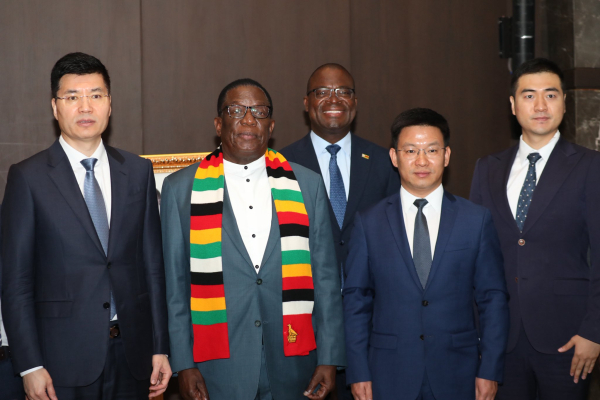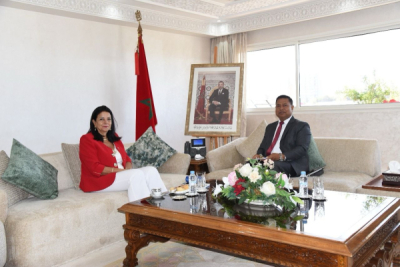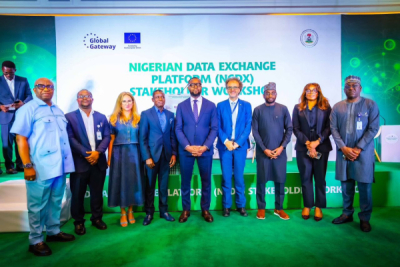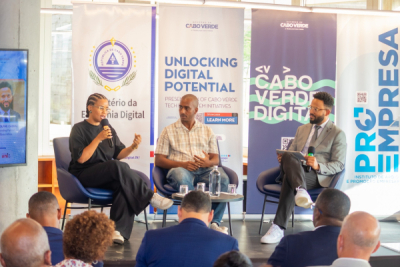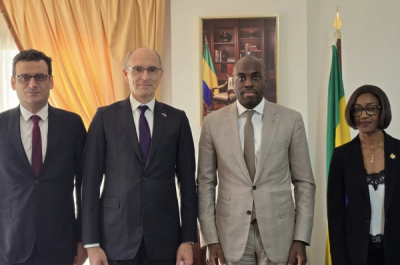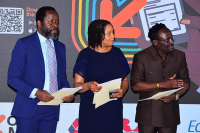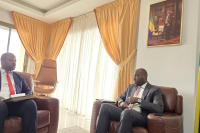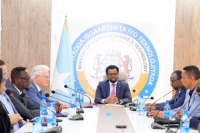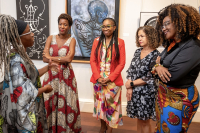
Public Management (597)
- Zimbabwe, Huawei discuss expanding ICT talent development cooperation
- Plans include digital training center aligned with 2030 strategy
- No formal deal signed; talks follow prior LinkedIn, UAE partnerships
The Zimbabwean government is looking to deepen its cooperation with Huawei to develop digital talent, a key topic during discussions on Monday, September 1, between President Emmerson Mnangagwa and senior officials from the Chinese technology company during an official visit to China.
The proposed collaboration includes expanding investments in ICT talent and establishing a digital training center. This initiative aligns with Zimbabwe’s national digital transformation strategy for 2030, where one of the three main pillars is the development of digital skills and capacity building. The government has previously identified the lack of ICT skills and low digital literacy as major challenges to the country's digital transformation.
In response, Zimbabwe has sought out multiple partnerships. In August 2024, the government signed an exploratory agreement with LinkedIn to develop the digital skills of civil servants and young people through the "LinkedIn Learning" platform. In April 2025, a program to train 1.5 million citizens in programming and artificial intelligence was launched with support from the United Arab Emirates as part of the “Zimbabwe Digital Skills Program.”
During that program's launch, authorities said they wanted to lay “the foundations for a future-oriented workforce proficient in cutting-edge technologies.” The World Bank estimates that 230 million jobs in sub-Saharan Africa will require digital skills by 2030. Zimbabwe faces high rates of unemployment and underemployment, particularly among young people, with the unemployment rate estimated at 35% in 2021.
While Huawei has stated it “remains committed to playing a central role in Zimbabwe’s digitalization agenda,” no new formal agreement has been signed or announced at this time.
Isaac K. Kassouwi
-
Mauritius ranks top in Africa for AI readiness and ICT infrastructure.
-
National Digital Mauritius 2030 plan drives inclusive, next-gen digital economy.
-
Strategic international partnerships boost innovation, start-ups, and tech adoption.
Mauritius is positioning itself as a digital hub at the crossroads of Africa and the Indian Ocean, leveraging strategic vision, innovation, and international collaboration to become a model of digital transformation.
The island nation has advanced rapidly in recent years through coherent strategies, heavy infrastructure investments, and continuous support for innovation. These efforts place Mauritius among Africa’s best-prepared countries for a digital economy transition.
International Rankings Highlight Progress
The United Nations’ 2024 E-Government Development Index ranks Mauritius 76th globally, underlining its leadership in East Africa with a score of 0.7506. Meanwhile, the AI Readiness Index 2024, which assesses governance, technological capabilities, and data availability, ranks Mauritius 69th worldwide—second in Africa and first in Sub-Saharan Africa—outperforming South Africa, Rwanda, Morocco, and Senegal.
Mauritius also ranks third in Africa on the ITU’s 2025 ICT Development Index with a score of 86.3, reflecting robust digital infrastructure and a thriving tech ecosystem.
Ambitious Vision: Digital Mauritius 2030
The country’s Digital Mauritius 2030 plan aims to build an inclusive, sustainable digital economy, structured around five pillars: digital governance, ICT infrastructure, innovation, talent management, and cybersecurity.
Mauritius has rolled out a national fiber-optic network, expanded 4G LTE coverage, and initiated 5G deployment. Tier-4 data centers and upcoming 5G Advanced trials are expected to accelerate IoT adoption and next-generation digital services.
Inclusive initiatives, such as free mobile internet for citizens aged 18–25 and digital skills training programs, reinforce talent development. Internet penetration reached 79.5% at the start of 2025, up from 75.5% in January 2024, according to DataReportal.
International Partnerships Drive Innovation
Strategic collaborations with India, the EU, and UNDP have fostered digital literacy programs, start-up support, and technology transfer. These partnerships enhance access to financing and advanced technologies, accelerating Mauritius’ 2030 digital vision.
By combining strategic planning, strong infrastructure, and global collaboration, Mauritius is not only a regional leader but also aims to compete with emerging digital economies worldwide, creating a model of inclusive, sustainable growth for Africa.
Samira Njoya
- Morocco, India deepen digital cooperation under “Digital Morocco 2030”
- Aim to boost investment, skills, AI, cloud, and 5G rollout
- Morocco targets $11B digital sector, stronger global innovation ranking
Morocco is strengthening its cooperation with India on digital transformation, a topic discussed on Wednesday, August 27, in a meeting between Moroccan Minister of Digital Transition, Amal El Fallah Seghrouchni, and Indian Ambassador Sanjay Rana. The initiative is part of Moroccan authorities' efforts to achieve the goals set in the nation’s "Digital Morocco 2030" strategy.
According to a ministry statement on its Facebook page, the discussions highlighted the two countries’ desire to deepen their partnership in technology and digital transition to attract more investment. Morocco aims to "turn the country into a digital hub to accelerate social and economic development" and increase the digital sector's economic contribution to 100 billion dirhams ($11 billion). Since launching the strategy in September 2024, the country has explored international partnerships with entities and nations including the UNDP, CEMAC, Japan, the World Bank, Estonia, the United States, the European Union, Finland, China, Saudi Arabia, Brazil, Nokia, Onepoint, and Portugal.
India's Digital Expertise
The partnership comes as India is ranked 39th out of 133 countries on the 2024 Global Innovation Index, making it first in Southeast Asia and among lower-middle-income countries. Morocco ranks 66th. According to the International Telecommunication Union (ITU), both nations are also considered global examples in cybersecurity, although Morocco still needs to improve its technical measures and capacity building.
On the UN's e-Government Development Index (EGDI), Morocco is six spots ahead of India, ranking 90th in 2024 with a score of 0.6841 out of 1, compared to India's 0.6678. However, the Asian nation is a world leader in the Online Services Sub-Index (OSI) with a score of 0.8144 out of 1, far ahead of Morocco's 0.5754, which is below the global average. Morocco aims to enter the global top 50 in this category by 2030, a significant jump from its 113th position in 2022.
The two countries are closely matched in human capital, with neither reaching the global average. However, Morocco leads in telecommunications infrastructure with a score of 0.8827 against India's 0.5700, despite India having 806 million internet subscribers, according to DataReportal.
India also boasts the world's largest biometric identification system, Aadhaar, which has been widely praised by international institutions. In its "E-Government Survey 2024," the UN noted that the program is voluntary, yet a majority of India's 1.33 billion citizens have joined over the past decade. The government estimates the system has generated more than $1.2 billion in savings, largely through direct benefit payments. It has also inspired innovations like DigiLocker, an application that stores official documents online and is used by over 100 million people to hold more than 5 billion files.
Opportunities for Indian Companies
Morocco's efforts to accelerate its digital ecosystem create numerous opportunities for international technology companies, including those from India.
The country has made broadband a priority. The rollout of 4G is ongoing, and fiber optic coverage is set to increase from 1.5 million households in 2022 to 5.6 million by 2030. The launch of 5G is also planned, with licenses already awarded and a target of 70% national coverage by 2030, supported by an estimated $9 billion investment. These projects offer opportunities for service providers, equipment manufacturers, and satellite operators in a country where, despite a 91% internet penetration rate, according to the ITU, some underserved areas still exist.
The kingdom is also focused on digital skills training to ensure the availability of a qualified talent pool. The country plans to train 20,000 new talents starting in 2026, rising to 45,000 by 2030. For reskilling, the targets are 26,000 from 2026 and 50,000 from 2030. Morocco also aims to attract foreign talent, with a goal of 4,000 per year starting in 2026 and 6,000 by 2030.
Morocco is working to boost its appeal to major international digital players. The country wants to host "hyperscalers" specializing in cloud and data centers and is banking on the development of artificial intelligence to accelerate the digitization of public and private services. The stated goal is to attract new AI investors and cement Morocco's position as a regional innovation hub.
Isaac K. Kassouwi
-
Nigeria to launch Data Exchange Platform by end of 2025
-
NGDX to centralize secure data sharing across government, businesses
-
Part of digital drive aiming ICT to reach 22% of GDP by 2027
The Nigerian government is preparing to launch the Nigerian Data Exchange Platform (NGDX), a digital infrastructure designed to centralize and secure data sharing between government agencies and businesses. The platform is expected to be operational by the end of 2025.
The initiative was discussed on Monday, August 25, at a workshop in Abuja that brought together stakeholders and international partners, including the European Union, Finland, and Estonia. In a post on X, Minister of Digital Economy Bosun Tijani explained that the NGDX will facilitate secure data sharing, stimulate innovation and inclusive growth, and offer citizens faster, more reliable services while ensuring privacy and data security.
The platform is part of the Nigerian government's digital transformation efforts to simplify administrative procedures, reduce inefficiencies, and boost innovation in sectors like health, agriculture, fintech, and education. Once operational, it will, for example, prevent citizens from having to repeatedly enter the same personal information for different government services.
"We've seen how interoperability transformed financial services through NIBSS. NGDX will extend that power across our entire economy," Tijani said, referring to the Nigeria Inter-Bank Settlement System. Nigerian authorities are aiming for information and communication technologies (ICT) to contribute 22% to the country's GDP by 2027.
Isaac K. Kassouwi
-
Cape Verde launches BOOST.CV to support 150 young digital entrepreneurs with training, mentoring, and incubation.
-
The government offers extensive support including scholarships, funding, tech event participation, and a $24 million Morabeza Fund.
-
Despite ranking 75th globally and 2nd in West Africa, Cape Verde faces challenges from infrastructure gaps, investment shortages, and a cautious population favoring public jobs.
Cape Verde aims to make digital technology a core part of its socio-economic growth. The government targets increasing the digital sector’s share of GDP from about 5% in the near future.
On July 28, the Cape Verdean government launched the BOOST.CV programme. It intends to back 150 young entrepreneurs in the digital sector by offering training, mentoring, and project incubation.
Deputy Prime Minister Olavo Correia said, “This is not just a technological tool, but a public policy instrument designed to generate real impact. We firmly believe that Cape Verdean talent, both on the islands and in the diaspora, is our greatest resource. And it is our responsibility as a State to create the conditions for this talent to flourish and innovate.”
BOOST.CV complements earlier measures. In May, Pedro Lopes, Secretary of State for the Digital Economy, told Agence Ecofin that the “Cape Verde Digital” programme is a flagship initiative. “Through digital.cv, you can explore our ecosystem. We support 200 young people annually via scholarships and fund around 100 start-ups with two co-founders receiving six minimum salaries, plus logistical and marketing assistance. The Go Global programme finances participation in international tech events.”
Other programmes include "Reinvent Cape Verde," where start-ups solve challenges set by public and private institutions via hackathons, and the Morabeza Fund, a $24 million fund geared toward growing tech start-ups led by youth and women.
Lopes also highlighted regulatory progress, noting a dedicated start-up law with tax benefits, a special technology economic zone, and modern laws on data protection and digital transactions. The government has simplified business registration, launched visas for digital nomads, and opened a technology park.
Cape Verde’s start-up ecosystem ranks 75th worldwide and 2nd in West Africa, according to StartupBlink’s Global Startup Ecosystem Index 2025. The report notes that start-ups face challenges from poor physical infrastructure and a weak investment climate. Additionally, many citizens prefer stable public sector jobs and view entrepreneurship as risky.
Isaac K. Kassouwi
Gabon is deepening international partnerships to fast-track its digital transformation. After recent discussions with Botswana, President Brice Clotaire Oligui Nguema has now turned to Turkey for support.
On July 29, Mark Alexandre Doumba, Gabon's Minister of the Digital Economy, met with Can İncesu, Turkey's Ambassador to Gabon, to discuss expanding digital cooperation.
During the meeting, Doumba presented Gabon’s digital roadmap. He emphasized four key priorities: modernizing public administration, expanding digital infrastructure, ensuring data governance and technological sovereignty, and training young digital talent.
Ambassador İncesu expressed Turkey’s interest in supporting Gabon’s efforts. He highlighted potential cooperation in e-government systems, electronic signatures, remote payment solutions for public services, and telecom infrastructure development in underserved areas.
Turkey ranks 27th out of 193 countries on the UN E-Government Development Index (EGDI), with a score of 0.8913, well above the global average of 0.6382. It scores 0.9225 in online services, 0.9192 in human capital, and 0.8322 in telecom infrastructure.
In 2024, Turkey reported 87.3% internet penetration and 96% mobile coverage, according to the International Telecommunication Union (ITU). On the 2025 ICT Development Index, Turkey scored 88.5 out of 100.
Gabon currently ranks 121st globally on the EGDI, with a score of 0.5741. The country performs strongly in telecom infrastructure (0.8263) but lags in online services (0.3188) and human capital (0.5772).
Despite these gaps, Gabon aims to boost the digital sector’s share of GDP to 10–12% by end-2025, up from around 5%. The government also wants to diversify the economy and reduce reliance on extractive industries by investing in digital tools and services.
While both sides expressed strong intent, the partnership remains at an early stage. So far, no official agreement has been signed. The two parties agreed to continue technical discussions to identify high-impact projects for Gabonese citizens.
The road to a full partnership still needs building. Future meetings will determine the real scope and effectiveness of this cooperation.
This article was initially published in French by Isaac K. Kassouwi
Edited in English by Ange Jason Quenum
-
Liberia launches mobile tax payment system via *144#, in partnership with Orange Money and Ecobank.
-
Covers 18 government agencies; no internet needed; users get SMS confirmation.
-
Aims to boost inclusion, transparency, and revenue through digital access.
The Liberia Revenue Authority (LRA) finalized an agreement on Wednesday, July 23, with Orange Money Liberia and Ecobank for a new digital system. This system will allow citizens to pay taxes and public fees directly via their mobile phones.
“In just five quick steps, a taxpayer can complete a transaction, receive confirmation, and move on with their day,” said Maxwell Dodd, CEO of Orange Money Liberia. “We are excited to partner with the LRA and Ecobank to help modernize Liberia's tax system.”
Taxpayers can now make payments by dialing the USSD code *144#, without needing an internet connection. By entering their Tax Identification Number (TIN), the amount due, and the type of payment, they instantly receive an SMS confirmation. The service already covers 18 ministries and government agencies. Public officials have been trained to ensure its effective rollout.
The initiative aims to simplify tax payments, especially for populations living far from urban centers. It also enhances the transparency and traceability of public revenue. It promotes financial inclusion by being accessible to anyone with a mobile phone.
In the medium term, this platform could help broaden the tax base, increase state revenue, and improve administrative efficiency. Liberia is aligning with a regional trend where mobile finance is becoming a tool for transforming public services. In the longer term, this public-private partnership model could inspire other West African countries as they transition toward more digital, inclusive, and locally adapted governance.
Adoni Conrad Quenum
• Gabon plans to restore IAI as a leading African tech training center.
• Reforms target curriculum, governance, and member state coordination.
• Move addresses aims continent-wide digital skills shortage.
The Gabonese government aims to restore the Libreville-based African Institute of Computer Science (IAI), founded in 1971, to its former status as a leading center for training high-level computer engineers on the continent. This initiative is part of the administration's broader effort to revitalize the pan-African institution.
Mark Alexandre Doumba, Gabon's Minister of Digital Economy, Digitalization and Innovation, met on Tuesday, July 22, with the IAI leadership to conduct a full review of the current situation. He reaffirmed his commitment to continuing a deep overhaul of the Institute, aligning with a pledge made by his predecessor.
“While the IAI long embodied excellence and innovation in the digital field in Africa, structural and organizational difficulties in recent years have slowed its development and influence,” the ministry stated in a press release published on Facebook.
Among the priorities discussed were modernizing training programs, implementing a new educational and managerial approach, overhauling governance, and developing a comprehensive recovery plan. The minister also announced the upcoming convening of an extraordinary board meeting with member states to approve a coordinated relaunch.
The government’s commitment comes amid a digital transformation marked by a growing demand for digital skills. According to the World Bank, 230 million jobs in Sub-Saharan Africa will require digital competencies by 2030, with a strong concentration in digital services. These opportunities will demand profiles equipped with intermediate or advanced skills.
However, a study by Talentum, a fintech specializing in human resources, indicates that most African countries still train fewer than 5,000 computer engineers per year, while demand is often ten times higher. This shortage of technical skills significantly slows the progress of digital transformation on the continent.
For now, the revival of the IAI remains a strong political will that still needs to be implemented. Questions remain about the sustainability of reform financing, the institution’s capacity to keep pace with rapid technological changes, and the effective commitment of all member states. These include Benin, Burkina Faso, Cameroon, Central African Republic, Côte d’Ivoire, Gabon, Niger, Senegal, Chad, Togo, and Congo.
Isaac K. Kassouwi
Highlights:
- Somalia and UNDP signed an MoU to support digital governance and public service innovation.
- The deal aims to boost human capital, e-government infrastructure, and digital inclusion.
- Somalia ranks near bottom in global digital and cybersecurity indices.
Somalia has signed a memorandum of understanding with the United Nations Development Programme (UNDP) to accelerate its national digital transformation agenda. The agreement was inked on Wednesday, July 16, in Mogadishu and aims to enhance cooperation in digital governance, innovation, public service delivery, and human capital development.
Lionel Laurens, UNDP’s resident representative in Somalia, said the MoU would serve as a framework for strengthening Somalia’s digital infrastructure and inclusion strategy, particularly in areas such as e-governance and capacity building.
The move is part of a broader international outreach by the Somali government to close its digital gap and promote socio-economic development. Earlier this month, Somali officials reiterated their commitment to international collaboration during a high-level meeting in Switzerland, holding talks with representatives from the International Telecommunication Union (ITU), Malaysia, Saudi Arabia, and Djibouti.
Topics under discussion included youth digital skills development, telecommunications infrastructure, governance, cybersecurity, and investment in emerging technologies.
Somalia remains one of the world’s least digitally developed countries. According to the UN’s 2024 E-Government Development Index, Somalia ranks 191 out of 193, with a score of just 0.1468—far below the African average of 0.4247. In the 2024 Global Cybersecurity Index by the ITU, Somalia is placed at level 4 out of 5 with a score of 37.38 out of 100, underscoring the country’s significant technical and regulatory challenges.
Laurens reaffirmed UNDP’s support for the Somali federal government and emphasized the role of the Ministry of Telecommunications as a key driver of the nation’s digital transition. However, he noted that this is only an initial framework agreement, and its practical outcomes will depend on subsequent implementation steps.
This article was initially published in French by Isaac K. Kassouwi.
Edited in English by Ola Schad Akinocho.
• My Afro Origins platform is dedicated for Afro-descendants seeking citizenship under a new return law recognizing descendants of enslaved Africans.
• Move aligns with global diaspora initiatives like Ghana’s “Year of Return” and Guinea-Bissau’s citizenship program.
• Platform offers application tools with a $100 fee, aiming to strengthen diaspora ties and development.
Benin officially launched My Afro Origins, a digital platform designed to accept applications for Beninese nationality from Afro-descendants. The portal went live on Friday, July 4, 2025.
The platform supports the implementation of Law No. 2024-31, passed on September 2, 2024, which for the first time guarantees the right of return and citizenship to descendants of sub-Saharan Africans who were deported during the slave trade and the transatlantic triangle trade.
“Our brothers and sisters in the diaspora, forcibly uprooted during the dark hours of the transatlantic slave trade, must reclaim their place within the African community,” said Benin’s Minister of Foreign Affairs, Olushegun Adjadi Bakari. “It is time to heal these wounds and recreate that sacred bond with those who, though physically distant, carry Africa in their hearts.”
The announcement comes as many Afro-descendants, especially African Americans and Afro-Caribbeans, seek to return to Africa, reconnect with their heritage, and contribute to the continent’s development. It also aligns with the United Nations’ International Decade for People of African Descent from 2015 to 2024, which promotes human rights, justice, and development for people of African heritage living outside the continent.
Benin has launched several initiatives to encourage the return of Afro-descendants and strengthen ties with its global diaspora. The Vodun Days festival has become a major event for the African diaspora, attracting visitors from Haiti, the United States, Brazil, and increasingly from Guadeloupe, all seeking to reconnect with their roots.
This initiative follows similar efforts in other countries, such as Ghana’s Year of Return in 2019 and Guinea-Bissau’s recent decision to grant citizenship and issue national passports to an initial group of people of African descent.
Beyond granting Beninese nationality to Afro-descendants, the program offers opportunities for economic, cultural, and educational development.
The My Afro Origins platform allows users to access information, prepare their application, and pay the $100 processing fee.
Lydie Mobio
More...
- Somali officials held talks with international leaders during the WSIS+20 meeting in Geneva
- Discussions focused on digital inclusion, youth training, e-governance, and cybersecurity
- Somalia ranks low on global digital development indexes but is taking early steps to improve
Somalia is aiming to boost international cooperation in digital development, according to government statements made on the sidelines of the WSIS+20 review held in Geneva from July 7 to 11. The event marked 20 years since the launch of the World Summit on the Information Society.
Mohamed Adan Macallin, Somalia’s Minister of Telecommunications and Technology, met with Doreen Bogdan-Martin, Secretary-General of the International Telecommunication Union (ITU), and Cosmas Luckyson Zavazava, Director of the ITU’s Telecommunication Development Bureau. He also held talks with his counterparts from Malaysia and Djibouti, Fahmi Fadzil and Ridwaan Abdulaahi Bahdoon.
Discussions covered key areas such as digital inclusion, training in digital skills for youth and civil servants, digital governance, and cybersecurity.
These efforts are part of Somalia’s broader push to promote technological progress and digital access as drivers of social and economic development. However, the country still faces significant challenges. In the United Nations 2024 E-Government Development Index (EGDI), Somalia ranked 191st out of 193 countries, with a score of 0.1468 out of 1—well below the African average of 0.4247 and the global average of 0.6382.
In terms of cybersecurity, Somalia was placed in category 4 out of 5 in the ITU’s 2024 Global Cybersecurity Index, indicating only a basic level of commitment. The country scored 37.38 out of 100, highlighting the need to improve technical measures, legal frameworks, and capacity building.
For now, the talks in Geneva remain at the discussion stage, with no formal agreements signed. However, in May, Somalia took a first concrete step by signing a memorandum of understanding with Malaysia’s national cybersecurity agency, a country widely recognized for its leadership in this field.
• Cape Verde is exploring digital cooperation with South Korea after a recent technical mission
• Talks focus on data governance, public service digitization, and cybersecurity
• No agreement yet, but South Korea is seen as a key potential partner
Cape Verde's government is exploring a partnership with South Korea in digital transformation. To advance this initiative, a delegation led by the Directorate General of Telecommunications and Digital Economy recently completed a technical mission to South Korea.
In a statement released Monday, July 7, the Ministry of Digital Economy explained that discussions focused on how integrated data governance, the digitization of public services, and cybersecurity can strengthen citizens' trust, boost the digital economy, and improve state efficiency.
This initiative aligns with Cape Verdean authorities' ambition to make digital technology a cornerstone of socio-economic development in the coming years. In a recent interview with the economic news agency Ecofin Agency, Pedro Lopes, Secretary of State for Digital Economy, explained that digital technology can accelerate economic transformation despite limited natural resources. He stated, "We are also modernizing tourism, the blue economy, and agriculture through digital solutions, and we are supporting our youth to create globally competitive startups."
South Korea appears to be a strong ally in achieving these goals. The International Telecommunication Union (ITU) considers South Korea a global model in cybersecurity. Regarding digital transformation, it ranked fourth worldwide in the United Nations' 2024 E-Government Development Index (EGDI), with a score of 0.9679 out of 1.
In the same EGDI index, Cape Verde ranks 111th globally, with a score of 0.6238 out of 1. This result is above the West African average but slightly below the global average, which stands at 0.6382. In cybersecurity, Cape Verde falls into the fourth of five categories, according to the ITU's Global Cybersecurity Index. While it performs well on regulatory aspects, the country still needs to strengthen its technical and organizational frameworks, improve international cooperation, and invest in developing human skills.
It is worth noting, however, that talks between South Korea and Cape Verde are still in the early stages. Although Cape Verdean authorities say they have identified concrete opportunities for future collaboration, no formal agreement has yet been signed or announced. Further developments will be needed to assess whether this rapprochement will lead to a genuine partnership and to measure its potential impact.
Isaac K. Kassouwi
• Burkina Faso and the U.S. discussed digital cooperation, focusing on cybersecurity and infrastructure
• 2025 plans include data centers, network expansion, digital IDs, and a $150M transformation project
• Talks are early-stage; U.S. firms like Starlink and AWS may benefit as Burkina Faso seeks to close its digital gap
The Burkinabe government is exploring stronger digital cooperation with the United States. This was a key topic last week during a meeting between Aminata Zerbo/Sabane (photo, right), Minister of Digital Transition, and Joann Lockard (photo, left), the U.S. Ambassador to Burkina Faso.
"The government of Burkina Faso is undertaking many initiatives to support digital transition," Ambassador Lockard stated. "The American experience can be of great help in making this transition a success, particularly in the fields of cybersecurity and data control to protect citizens." She expressed confidence in the potential of American companies in the digital sector to support Burkinabe authorities' projects.
Among the major projects announced for 2025 are the completion of data centers, already 70 percent finished, and extending network coverage to at least 500 additional underserved localities. The ministry also plans to digitize more administrative services, carry out a large-scale population enrollment for electronic unique identification, and launch the Digital Transformation Acceleration Project, estimated at $150 million.
While no specific companies have been named yet in connection with this outreach, these projects could offer tangible opportunities for several U.S. firms already active in Africa. For instance, American Tower, a telecom infrastructure provider, and Starlink, for satellite internet access, might be considered for expanding network coverage. Other companies specializing in digital transformation, such as Microsoft, Oracle, Amazon Web Services (AWS), Cybastion, or Cisco, could also fit into this dynamic.
Furthermore, the United States is among the most advanced countries in digital governance. The United Nations ranks it 19th globally in the E-Government Development Index (EGDI), with a score of 0.9195 out of 1. In cybersecurity, the International Telecommunication Union (ITU) considers the U.S. a benchmark in its 2024 Global Cybersecurity Index. The U.S. scores 97.4 out of 100 on the ICT Development Index for 2025.
In contrast, Burkina Faso ranks 175th in the EGDI with a score of 0.2895, well below the global average of 0.6382. For cybersecurity, the country falls into the third of five categories, indicating that further efforts are needed, particularly to strengthen technical capacity and develop human capital.
Discussions between the two parties remain at a preliminary stage. No agreement has been signed or officially announced yet. The progression of these talks will need to be monitored to assess concrete partnership prospects and the actual involvement of American companies in Burkina Faso’s digital transformation.
Isaac K. Kassouwi
-
Algeria urged to update cybercrime and AI laws, says parliament speaker.
-
National strategy, school, and global partnerships underway.
-
Gaps remain in tech capacity and training despite strong legal base.
Algeria must modernize its regulatory framework to keep pace with technological developments and strengthen the fight against cybercrime. This message came from Brahim Boughali, Speaker of the National People's Assembly (APN), on Monday, June 30. He spoke during a parliamentary session focused on legal accountability in cybercrime and artificial intelligence.
According to Boughali, the rapid evolution of cyberspace demands a serious overhaul of legislative mechanisms to effectively confront emerging digital threats. He emphasized the importance of balancing citizens' rights and freedoms with the need for a robust approach to cybercrime prevention. He also highlighted the urgent need for a flexible legal framework that can anticipate future challenges related to artificial intelligence while remaining aligned with constitutional principles and international standards on data protection and digital sovereignty.
This legislative push complements the executive branch's efforts to bolster national cybersecurity. Algeria is looking to deepen cooperation with South Korea, which the International Telecommunication Union (ITU) considers a model in cybersecurity. It has also strengthened ties with Russia to advance in this field. A national cybersecurity strategy is currently being developed. In 2024, the country established a dedicated cybersecurity school, and the topic has been integrated into youth ICT (Information and Communication Technology) training programs, particularly through the nationwide "Skills Centers."
Despite these efforts, the ITU notes that Algeria already has a solid legal foundation, awarding it a score of 19.18 out of 20 in the legal framework category of the Global Cybersecurity Index. However, the country still faces challenges in expanding technical capabilities, building institutional capacity, training talent, and forging essential partnerships for effective cybersecurity. Algeria received an overall score of 65.87 out of 100, placing it in the third tier out of five on the global scale.
Written in French by Isaac K. Kassouwi,
Translated and adapted into English by Mouka Mezonlin


